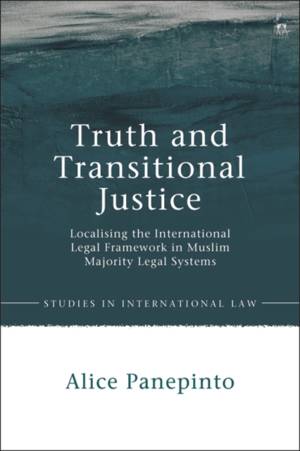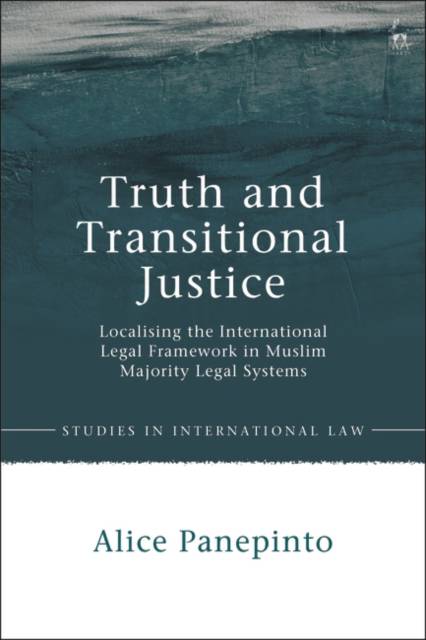
Bedankt voor het vertrouwen het afgelopen jaar! Om jou te bedanken bieden we GRATIS verzending (in België) aan op alles gedurende de hele maand januari.
- Afhalen na 1 uur in een winkel met voorraad
- In januari gratis thuislevering in België
- Ruim aanbod met 7 miljoen producten
Bedankt voor het vertrouwen het afgelopen jaar! Om jou te bedanken bieden we GRATIS verzending (in België) aan op alles gedurende de hele maand januari.
- Afhalen na 1 uur in een winkel met voorraad
- In januari gratis thuislevering in België
- Ruim aanbod met 7 miljoen producten
Zoeken
Truth and Transitional Justice
Localising the International Legal Framework in Muslim Majority Legal Systems
Alice Panepinto
€ 98,45
+ 196 punten
Uitvoering
Omschrijving
With a unique transitional justice perspective on the Arab Spring, this book assesses the relocation of transitional justice from the international paradigm to Islamic legal systems.
The Arab uprisings and new and old conflicts in the Middle East, North Africa and other contexts where Islam is a prominent religion have sparked an interest in localising transitional justice in the legal systems of Muslim-majority communities to uncover the truth about past abuse and ensure accountability for widespread human rights violations. This raises pressing questions around how the international paradigm of transitional justice, and in particular its truth-seeking aims, might be implemented and adapted to local settings characterised by Muslim majority populations, and at the same time drawing from relevant norms and principles of Islamic law.
This book offers a critical analysis of the relocation of transitional justice from the international paradigm to the legal systems of Muslim-majority societies in light of the inherently pluralistic realities of these contexts. It also investigates synergies between international law and Islamic law in furthering truth-seeking, the formation of collective memories and the victims' right to know the truth, as key aims of the international paradigm of transitional justice and broadly supported by the shari'ah. This book will be a useful reference for scholars, practitioners and policymakers seeking to better understand the normative underpinnings of (potential) transitional truth-seeking initiatives in the legal systems of Muslim-majority societies. At the same time, it also proposes a more critical and creative way of thinking about the challenges and opportunities of localising transitional justice in contexts where the principles and ideas of Islamic law carry different meanings.
The Arab uprisings and new and old conflicts in the Middle East, North Africa and other contexts where Islam is a prominent religion have sparked an interest in localising transitional justice in the legal systems of Muslim-majority communities to uncover the truth about past abuse and ensure accountability for widespread human rights violations. This raises pressing questions around how the international paradigm of transitional justice, and in particular its truth-seeking aims, might be implemented and adapted to local settings characterised by Muslim majority populations, and at the same time drawing from relevant norms and principles of Islamic law.
This book offers a critical analysis of the relocation of transitional justice from the international paradigm to the legal systems of Muslim-majority societies in light of the inherently pluralistic realities of these contexts. It also investigates synergies between international law and Islamic law in furthering truth-seeking, the formation of collective memories and the victims' right to know the truth, as key aims of the international paradigm of transitional justice and broadly supported by the shari'ah. This book will be a useful reference for scholars, practitioners and policymakers seeking to better understand the normative underpinnings of (potential) transitional truth-seeking initiatives in the legal systems of Muslim-majority societies. At the same time, it also proposes a more critical and creative way of thinking about the challenges and opportunities of localising transitional justice in contexts where the principles and ideas of Islamic law carry different meanings.
Specificaties
Betrokkenen
- Auteur(s):
- Uitgeverij:
Inhoud
- Aantal bladzijden:
- 280
- Taal:
- Engels
- Reeks:
Eigenschappen
- Productcode (EAN):
- 9781509957187
- Verschijningsdatum:
- 15/06/2023
- Uitvoering:
- Paperback
- Formaat:
- Trade paperback (VS)
- Afmetingen:
- 156 mm x 234 mm
- Gewicht:
- 394 g

Alleen bij Standaard Boekhandel
+ 196 punten op je klantenkaart van Standaard Boekhandel
Beoordelingen
We publiceren alleen reviews die voldoen aan de voorwaarden voor reviews. Bekijk onze voorwaarden voor reviews.









